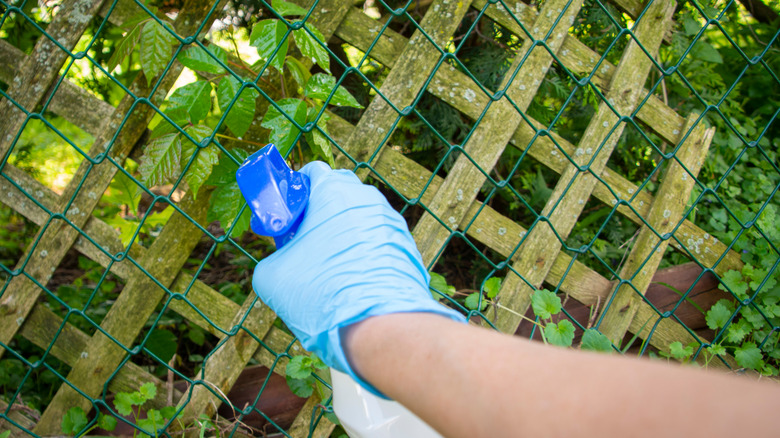If you’re a gardening expert, you’ve probably heard of triclopyr, a synthetic herbicide found in products like Ortho GroundClear, Vastlan, Bonide Stump-Out, Pathfinder II, Remedy Ultra, Crossbow Specialty Herbicide, and BioAdvanced Brush Killer Plus. These herbicides are all designed to selectively kill wood-stemmed, broadleaf vines like poison ivy and other invasive weeds. Unlike RoundUp and other indiscriminate herbicides, products containing triclopyr as their active ingredient will only target specific categories of plants. However, before you dive in and use a product that contains this ingredient, you should have a good understanding of what triclopyr herbicides are, how they are used, and whether or not they’re right for your needs.
Using any kind of weed-killer in your yard, be it a commercial product or a homemade concoction, requires a basic understanding of what weeds it will target, how far it will spread, and what safety precautions are required. Gloves, masks, and goggles are recommended whenever handling to prevent skin contact and protect against any mist droplets that could get in your eyes or mouth during spray applications. If it gets on you anyway, rinse the area thoroughly.
Where is triclopyr effective?

Triclopyr was originally developed for use in forestry settings but has since expanded to agricultural and even personal gardening use. It can be used to get rid of underbrush, invasive vines, and even trees. Triclopyr is also often applied to turfgrass as a way to rid it of overgrown weeds, since grass isn’t greatly harmed by this chemical. Broadleaf plants targeted by triclopyr include nettles, dandelions, clover, and varieties of ivy. These plants have a wide variety of leaves and often sport leaf stalks and sheaths. Some also have woody stems, like Chinese wisteria or the notorious kudzu.
Herbicides containing triclopyr can be applied directly to the foliage of these undesirable weeds, where it will be absorbed into the plant’s vascular system and eventually kill them off from the inside out. It can also be added to the soil, where it will travel up through the roots. However, one of the most directly-effective methods to rid your yard of these particular weeds is cutting the stem and applying the triclopyr right on the exposed interior. Over the course of a few weeks, these applications will eradicate the plants from your yard entirely. Because tree stumps are technically extremely woody stems, these can also be removed through the use of triclopyr.
Dangers of using triclopyr in your yard
Like any chemical, triclopyr can be hazardous to humans in addition to plants. It’s particularly harmful if it gets in your eyes, so always wear safety goggles when handling and follow product directions exactly. Triclopyr herbicides are generally low in toxicity to humans, but that doesn’t mean they are completely safe. In addition, while triclopyr is a selective herbicide that only goes after broadleaf weeds and woody vines, it doesn’t have the ability to tell one from the other, and not all broadleaf plants are unwanted. For example, boxwood shrubs, magnolia trees, rhododendrons, and mountain laurels are all broadleaf evergreens that are popular garden additions. You don’t want to harm one of these when trying to kill poison ivy.
Spraying triclopyr can have a wide reach, so you shouldn’t use this method in close proximity to broadleaf plants you want to keep. Similarly, triclopyr that seeps into the ground may linger, has the potential to contaminate groundwater, and will be destructive to any broadleaf plants it comes into contact with. This is why a direct method like applying the triclopyr herbicide directly on the foliage or cut stems of the weeds you’re trying to kill is your best option. This will reduce the risk of losing your more prized and appreciated garden foliage. In short, triclopyr herbicides are incredibly effective and recommended in highly-specific, controlled uses to maintain a gorgeous-looking lawn, but be careful to avoid damaging other plants.